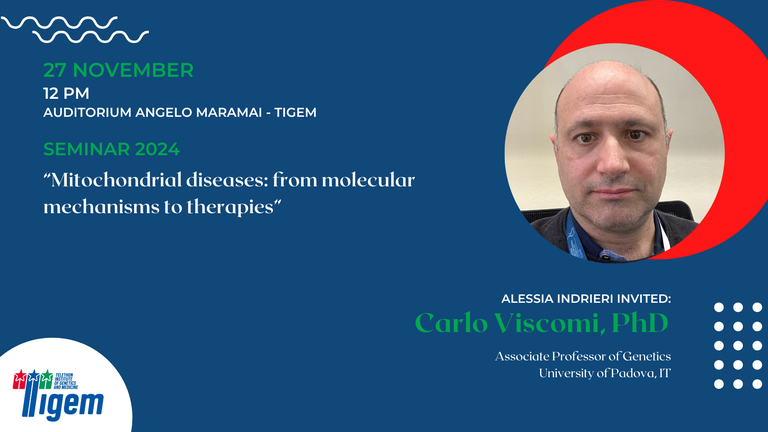Carlo Viscomi, PhD - "Mitochondrial diseases: from molecular mechanisms to therapies"
- When Nov 27, 2024 from 12:00 PM to 01:00 PM (Europe/Berlin / UTC100)
- Where Auditorium Angelo Maramai
- Contact Name Alessia Indrieri
- Contact Phone 08119230659
-
Add event to calendar
iCal

- https://www.tigem.it/newsroom/seminars/carlo-viscomi-phd-mitochondrial-diseases-from-molecular-mechanisms-to-therapies
- Carlo Viscomi, PhD - "Mitochondrial diseases: from molecular mechanisms to therapies"
- 2024-11-27T12:00:00+01:00
- 2024-11-27T13:00:00+01:00
Carlo Viscomi, PhD
Associate Professor of Genetics
University of Padova, IT
Short CV
Abstract
Mitochondrial diseases are rare genetic conditions due to impaired oxidative phosphorylation. No cure exists for these pathologies. Our lab is interested in understanding mitochondrial disease pathogenesis and developing new therapeutic approaches.
DNA polymerase γ (POLγ) is the key enzyme responsible for mitochondrial DNA replication, consisting of a catalytic POLγA subunit and two POLγB accessory subunits. Mutations in the POLG gene, encoding POLγA, lead to various mitochondrial diseases, with over 300 mutations identified. This study investigates the molecular mechanisms of the most common human POLG mutations (A467T, W748S, G848S, Y955C) by expressing and characterizing both human and corresponding mouse POLγ variants. Our data reveal that these mutations significantly impair human and mouse POLγ polymerase activities, with mouse variants generally showing milder effects. Cryogenic electron microscopy structural analysis highlighted differences between human and mouse POLγ, particularly in the POLγB subunit. This structural variance may underlie the higher activity and reduced severity of mutations in the mouse system.
In addition, we generated a panel of mouse models mirroring human POLG mutations, providing crucial insights into the pathogenesis of POLG-related disorders and establishing robust models for therapeutic development. Our findings emphasize the importance of POLγB in modulating the severity of POLG mutations.
In order to develop new therapies for mitochondrial diseases, we focused on AAV-mediated gene therapy approaches for Leigh disease, one of the most common manifestations of mitochondrial dysfunction in children. I will discuss our experience with this therapeutic strategy to correct mutations in both nuclear and mitochondrial genes.
Associate Professor of Genetics
University of Padova, IT
Short CV
Abstract
Mitochondrial diseases are rare genetic conditions due to impaired oxidative phosphorylation. No cure exists for these pathologies. Our lab is interested in understanding mitochondrial disease pathogenesis and developing new therapeutic approaches.
DNA polymerase γ (POLγ) is the key enzyme responsible for mitochondrial DNA replication, consisting of a catalytic POLγA subunit and two POLγB accessory subunits. Mutations in the POLG gene, encoding POLγA, lead to various mitochondrial diseases, with over 300 mutations identified. This study investigates the molecular mechanisms of the most common human POLG mutations (A467T, W748S, G848S, Y955C) by expressing and characterizing both human and corresponding mouse POLγ variants. Our data reveal that these mutations significantly impair human and mouse POLγ polymerase activities, with mouse variants generally showing milder effects. Cryogenic electron microscopy structural analysis highlighted differences between human and mouse POLγ, particularly in the POLγB subunit. This structural variance may underlie the higher activity and reduced severity of mutations in the mouse system.
In addition, we generated a panel of mouse models mirroring human POLG mutations, providing crucial insights into the pathogenesis of POLG-related disorders and establishing robust models for therapeutic development. Our findings emphasize the importance of POLγB in modulating the severity of POLG mutations.
In order to develop new therapies for mitochondrial diseases, we focused on AAV-mediated gene therapy approaches for Leigh disease, one of the most common manifestations of mitochondrial dysfunction in children. I will discuss our experience with this therapeutic strategy to correct mutations in both nuclear and mitochondrial genes.
